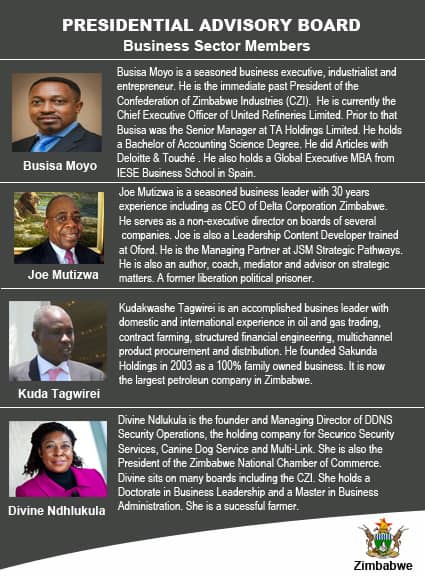By Peacemaker Zano
In simple terms, an advisory council is a collection of individuals who bring unique knowledge and skills which augment the knowledge and skills of the formal board of directors in order to effectively guide a given organization or nation.
The 26-member Presidential Advisory Council (PAC) that was recently appointed by President Emmerson Mnangagwa plays a crucial role in advising the President on key economic issues and reforms that will support his vision of making Zimbabwe a middle income economy by 2030.
According to the information revealed by the Ministry of Information, Publicity and Broadcasting on its twitter handle, the PAC will research, analyse and proffer constructive advice on a number of economic sectors that include tourism, ICT, agriculture, economy and financial services among others.
The appointment of the PAC is new to Zimbabwe, but will certainly provide the President with wide ranging ideas and suggestions that are needed in rebuilding the nation. It is pleasing that the members of the PAC will work towards a specific goal and its members have skills that complement the sectors they serve under.
For instance, under the business sector, President Mnangagwa appointed business minded people who include a seasoned businessman, Mr Busisa Moyo, Mr Joe Mutizwa who is also a business leader for 30 years, Mrs Divine Ndlukula who is the founder and managing director DDNS Security Operations together with Mr Kudakwashe Tagwirei who is the founder of Sakunda Holdings and has experience in the trading of oil and gas.
In other nations, advisory committees are created to address a specific organizational need. Such advisory councils are usually short-lived and are disbanded as soon as their specific goals are met. However, the PAC that was elected by President Mnangagwa will operate until the end of his term of office.
In other countries, for example, United States of America, that country’s President, Donald Trump appointed a team of ultra-rich financiers and businessmen as his core economic advisers. Normally, the advisory councils are non-profit committees but they are there just to give advice to the President on different socio-economic issues.
Also, in 2015, Nigeria’s President Muhammadu Buhari appointed a seven-member Presidential Advisory Committee on anti-corruption that comprises mostly of academics. The committee was appointed to advise him on the best way to tackle corruption and reform the legal system.
It is imperative to note that the role of PAC will be only to proffer suggestions and recommendations, and then it will be up to the President either to take and implement the recommendations or not.
Previously, people were complaining that politics was overshadowing economics and this has been affecting the economic growth of the nation. However, with the appointment of the advisory council, it is quite certain that focus will be on reviving the economy for prosperity.
As a listening leader, President Mnangagwa will have a great opportunity to get all the advice given to him by various stakeholders to drive vision 2030 and Zimbabweans are encourage to be fully behind this council as it gets down to performing its role.




